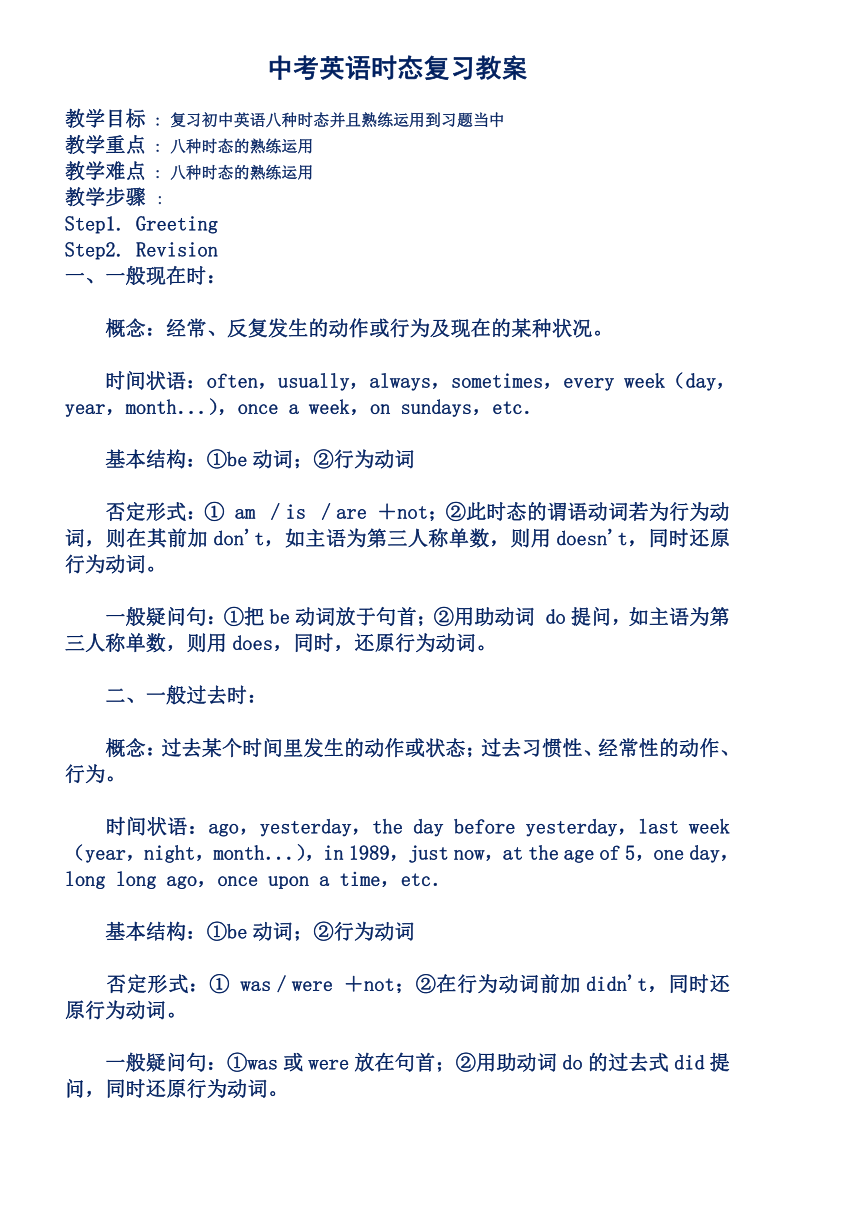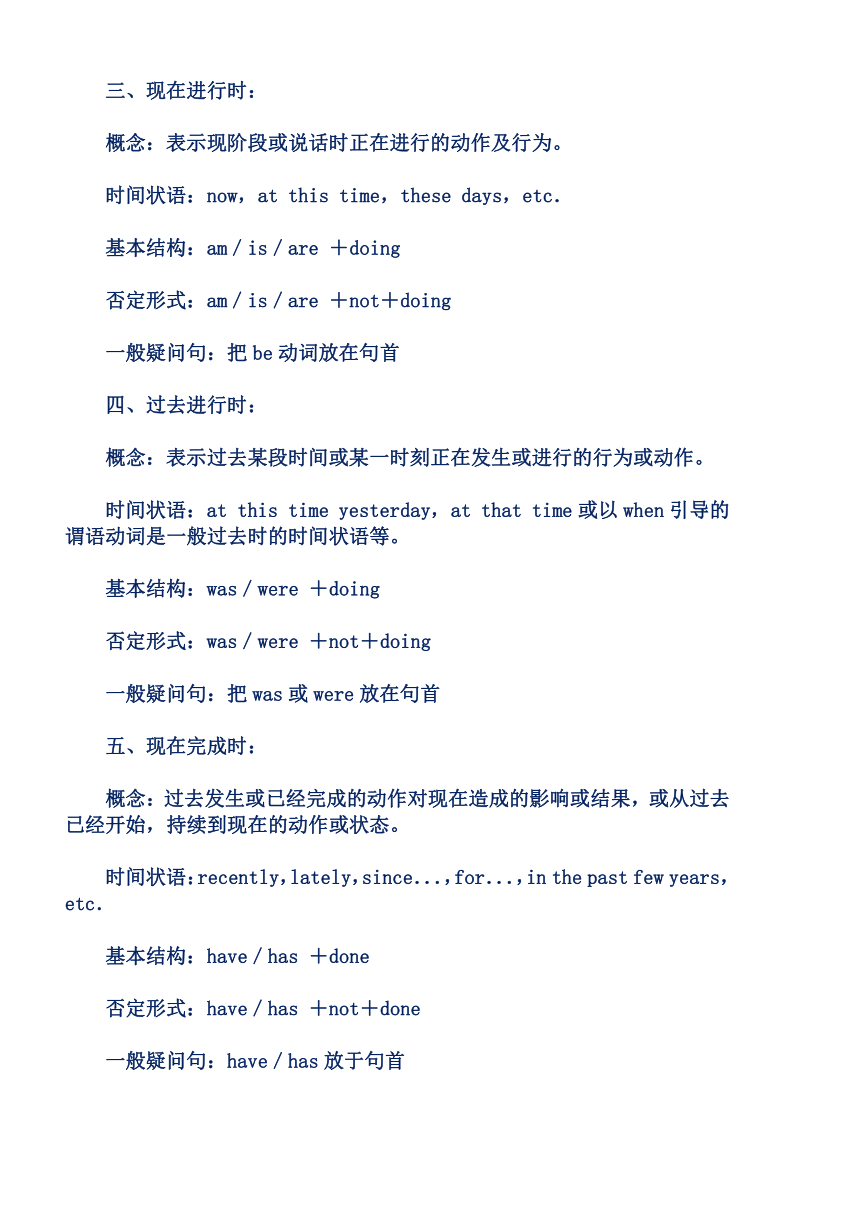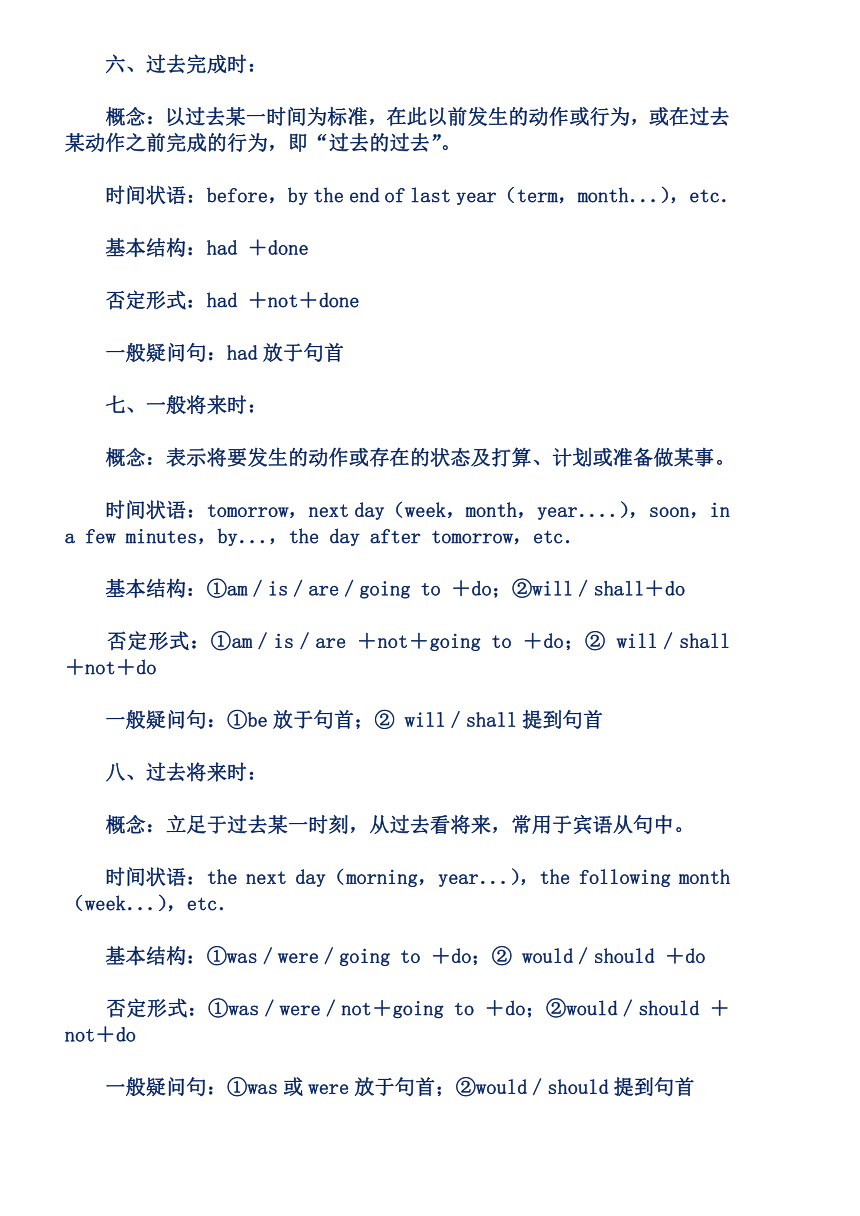人教版九年级全册 Unit14 I remember meeting all of you in Grade 7.时态复习 教案
文档属性
| 名称 | 人教版九年级全册 Unit14 I remember meeting all of you in Grade 7.时态复习 教案 |  | |
| 格式 | doc | ||
| 文件大小 | 40.0KB | ||
| 资源类型 | 教案 | ||
| 版本资源 | 人教新目标(Go for it)版 | ||
| 科目 | 英语 | ||
| 更新时间 | 2023-01-08 18:54:07 | ||
图片预览



文档简介
中考英语时态复习教案
教学目标 : 复习初中英语八种时态并且熟练运用到习题当中
教学重点 : 八种时态的熟练运用
教学难点 : 八种时态的熟练运用
教学步骤 :
Step1. Greeting
Step2. Revision
1、一般现在时:
概念:经常、反复发生的动作或行为及现在的某种状况。
时间状语:often,usually,always,sometimes,every week(day,year,month...),once a week,on sundays,etc.
基本结构:①be动词;②行为动词
否定形式:① am /is /are +not;②此时态的谓语动词若为行为动词,则在其前加don't,如主语为第三人称单数,则用doesn't,同时还原行为动词。
一般疑问句:①把be动词放于句首;②用助动词 do提问,如主语为第三人称单数,则用does,同时,还原行为动词。
二、一般过去时:
概念:过去某个时间里发生的动作或状态;过去习惯性、经常性的动作、行为。
时间状语:ago,yesterday,the day before yesterday,last week(year,night,month...),in 1989,just now,at the age of 5,one day,long long ago,once upon a time,etc.
基本结构:①be动词;②行为动词
否定形式:① was/were +not;②在行为动词前加didn't,同时还原行为动词。
一般疑问句:①was或were放在句首;②用助动词do的过去式did提问,同时还原行为动词。
三、现在进行时:
概念:表示现阶段或说话时正在进行的动作及行为。
时间状语:now,at this time,these days,etc.
基本结构:am/is/are +doing
否定形式:am/is/are +not+doing
一般疑问句:把be动词放在句首
四、过去进行时:
概念:表示过去某段时间或某一时刻正在发生或进行的行为或动作。
时间状语:at this time yesterday,at that time或以when引导的谓语动词是一般过去时的时间状语等。
基本结构:was/were +doing
否定形式:was/were +not+doing
一般疑问句:把was或were放在句首
五、现在完成时:
概念:过去发生或已经完成的动作对现在造成的影响或结果,或从过去已经开始,持续到现在的动作或状态。
时间状语:recently,lately,since...,for...,in the past few years,etc.
基本结构:have/has +done
否定形式:have/has +not+done
一般疑问句:have/has放于句首
六、过去完成时:
概念:以过去某一时间为标准,在此以前发生的动作或行为,或在过去某动作之前完成的行为,即“过去的过去”。
时间状语:before,by the end of last year(term,month...),etc.
基本结构:had +done
否定形式:had +not+done
一般疑问句:had放于句首
七、一般将来时:
概念:表示将要发生的动作或存在的状态及打算、计划或准备做某事。
时间状语:tomorrow,next day(week,month,year....),soon,in a few minutes,by...,the day after tomorrow,etc.
基本结构:①am/is/are/going to +do;②will/shall+do
否定形式:①am/is/are +not+going to +do;② will/shall+not+do
一般疑问句:①be放于句首;② will/shall提到句首
八、过去将来时:
概念:立足于过去某一时刻,从过去看将来,常用于宾语从句中。
时间状语:the next day(morning,year...),the following month(week...),etc.
基本结构:①was/were/going to +do;② would/should +do
否定形式:①was/were/not+going to +do;②would/should +not+do
一般疑问句:①was或were放于句首;②would/should提到句首
Step3 Practice
自测练习题
1.Sorry,I____to help you at ten.I was busy at the moment.
A.won't come B.can't come
C.didn't come D.shouldn't come
2.He_______this pen for five years.He______it in 1997.
A.has bought,bought. B.bought,bought
C.has kept,has bought D.has had,bought
3.She_________the flowers in the garden when I_________to see her yesterday.
A.watered,went B.was watering, went
C.watered,was going D.was watering,was going
4.I don 't know if my friend_________.If he _________,I'll let you know.
A.comes,comes B.comes, will come
C.will come,comes D.will come,will come
5.John said he_________ supper.He was quite full.
A.had had B.was having C.had D.has eaten
6.There_________two parties next week.
A.are going to be B.are going to have
C.is going to be D.will have
7.It______10 years since I______here.
A.is,come B.is,have come
C.was,came D.is,came
8.--Kate likes eating chocolate.
--____. Look, she is eating.
A.So Lucy does B.So does Lucy
C.So they do D.So do they
9.Kate_________to bed until her mother_________back.
A.won't go,come B.hadn't gone, came
C.went,came D.didn't go,came
10.His brother_________from home for a long time.
A.has left B.has been away
C.left D.will leave
11.--Lucy,___you____your ticket --Not yet.
A.did;find B.have;found C.has;found D.do;find
12.--____to the United States
--No,never,but I went to Canada a few years ago.
A.Have you been B.Have you gone
C.Did you go D.Have you went
13.The man who lived on the island thought he___ never____.
A.will;found B.would;be found C.is;found B.had;been found
14.--I don’t know if his uncle____.
--I think he___if it doesn’t rain.
A.will come; comes B.will come; will come
C.comes; comes D.comes; will come
15.--Linda had nothing for breakfast this morning,__
--No,she got up too late.
A.had she B.hadn’t she C.did she D.didn’t she
16.The flowers____well if they____.
A.won’t grow; don’t take good care of
B.don’t grow; are taken good care of
C. won’t grow; are not taken care of
D. don’t grow; don’t take care of
12.--____to the United States
--No,never,but I went to Canada a few years ago.
A.Have you been B.Have you gone
C.Did you go D.Have you went
13.The man who lived on the island thought he___ never____.
A.will;found B.would;be found C.is;found B.had;been found
14.--I don’t know if his uncle____.
--I think he___if it doesn’t rain.
A.will come; comes B.will come; will come
C.comes; comes D.comes; will come
15.--Linda had nothing for breakfast this morning,__
--No,she got up too late.
A.had she B.hadn’t she C.did she D.didn’t she
16.The flowers____well if they____.
A.won’t grow; don’t take good care of
B.don’t grow; are taken good care of
C. won’t grow; are not taken care of
D. don’t grow; don’t take care of
教学目标 : 复习初中英语八种时态并且熟练运用到习题当中
教学重点 : 八种时态的熟练运用
教学难点 : 八种时态的熟练运用
教学步骤 :
Step1. Greeting
Step2. Revision
1、一般现在时:
概念:经常、反复发生的动作或行为及现在的某种状况。
时间状语:often,usually,always,sometimes,every week(day,year,month...),once a week,on sundays,etc.
基本结构:①be动词;②行为动词
否定形式:① am /is /are +not;②此时态的谓语动词若为行为动词,则在其前加don't,如主语为第三人称单数,则用doesn't,同时还原行为动词。
一般疑问句:①把be动词放于句首;②用助动词 do提问,如主语为第三人称单数,则用does,同时,还原行为动词。
二、一般过去时:
概念:过去某个时间里发生的动作或状态;过去习惯性、经常性的动作、行为。
时间状语:ago,yesterday,the day before yesterday,last week(year,night,month...),in 1989,just now,at the age of 5,one day,long long ago,once upon a time,etc.
基本结构:①be动词;②行为动词
否定形式:① was/were +not;②在行为动词前加didn't,同时还原行为动词。
一般疑问句:①was或were放在句首;②用助动词do的过去式did提问,同时还原行为动词。
三、现在进行时:
概念:表示现阶段或说话时正在进行的动作及行为。
时间状语:now,at this time,these days,etc.
基本结构:am/is/are +doing
否定形式:am/is/are +not+doing
一般疑问句:把be动词放在句首
四、过去进行时:
概念:表示过去某段时间或某一时刻正在发生或进行的行为或动作。
时间状语:at this time yesterday,at that time或以when引导的谓语动词是一般过去时的时间状语等。
基本结构:was/were +doing
否定形式:was/were +not+doing
一般疑问句:把was或were放在句首
五、现在完成时:
概念:过去发生或已经完成的动作对现在造成的影响或结果,或从过去已经开始,持续到现在的动作或状态。
时间状语:recently,lately,since...,for...,in the past few years,etc.
基本结构:have/has +done
否定形式:have/has +not+done
一般疑问句:have/has放于句首
六、过去完成时:
概念:以过去某一时间为标准,在此以前发生的动作或行为,或在过去某动作之前完成的行为,即“过去的过去”。
时间状语:before,by the end of last year(term,month...),etc.
基本结构:had +done
否定形式:had +not+done
一般疑问句:had放于句首
七、一般将来时:
概念:表示将要发生的动作或存在的状态及打算、计划或准备做某事。
时间状语:tomorrow,next day(week,month,year....),soon,in a few minutes,by...,the day after tomorrow,etc.
基本结构:①am/is/are/going to +do;②will/shall+do
否定形式:①am/is/are +not+going to +do;② will/shall+not+do
一般疑问句:①be放于句首;② will/shall提到句首
八、过去将来时:
概念:立足于过去某一时刻,从过去看将来,常用于宾语从句中。
时间状语:the next day(morning,year...),the following month(week...),etc.
基本结构:①was/were/going to +do;② would/should +do
否定形式:①was/were/not+going to +do;②would/should +not+do
一般疑问句:①was或were放于句首;②would/should提到句首
Step3 Practice
自测练习题
1.Sorry,I____to help you at ten.I was busy at the moment.
A.won't come B.can't come
C.didn't come D.shouldn't come
2.He_______this pen for five years.He______it in 1997.
A.has bought,bought. B.bought,bought
C.has kept,has bought D.has had,bought
3.She_________the flowers in the garden when I_________to see her yesterday.
A.watered,went B.was watering, went
C.watered,was going D.was watering,was going
4.I don 't know if my friend_________.If he _________,I'll let you know.
A.comes,comes B.comes, will come
C.will come,comes D.will come,will come
5.John said he_________ supper.He was quite full.
A.had had B.was having C.had D.has eaten
6.There_________two parties next week.
A.are going to be B.are going to have
C.is going to be D.will have
7.It______10 years since I______here.
A.is,come B.is,have come
C.was,came D.is,came
8.--Kate likes eating chocolate.
--____. Look, she is eating.
A.So Lucy does B.So does Lucy
C.So they do D.So do they
9.Kate_________to bed until her mother_________back.
A.won't go,come B.hadn't gone, came
C.went,came D.didn't go,came
10.His brother_________from home for a long time.
A.has left B.has been away
C.left D.will leave
11.--Lucy,___you____your ticket --Not yet.
A.did;find B.have;found C.has;found D.do;find
12.--____to the United States
--No,never,but I went to Canada a few years ago.
A.Have you been B.Have you gone
C.Did you go D.Have you went
13.The man who lived on the island thought he___ never____.
A.will;found B.would;be found C.is;found B.had;been found
14.--I don’t know if his uncle____.
--I think he___if it doesn’t rain.
A.will come; comes B.will come; will come
C.comes; comes D.comes; will come
15.--Linda had nothing for breakfast this morning,__
--No,she got up too late.
A.had she B.hadn’t she C.did she D.didn’t she
16.The flowers____well if they____.
A.won’t grow; don’t take good care of
B.don’t grow; are taken good care of
C. won’t grow; are not taken care of
D. don’t grow; don’t take care of
12.--____to the United States
--No,never,but I went to Canada a few years ago.
A.Have you been B.Have you gone
C.Did you go D.Have you went
13.The man who lived on the island thought he___ never____.
A.will;found B.would;be found C.is;found B.had;been found
14.--I don’t know if his uncle____.
--I think he___if it doesn’t rain.
A.will come; comes B.will come; will come
C.comes; comes D.comes; will come
15.--Linda had nothing for breakfast this morning,__
--No,she got up too late.
A.had she B.hadn’t she C.did she D.didn’t she
16.The flowers____well if they____.
A.won’t grow; don’t take good care of
B.don’t grow; are taken good care of
C. won’t grow; are not taken care of
D. don’t grow; don’t take care of
同课章节目录
- Unit 1 How can we become good learners.
- Section A
- Section B
- Unit 2 I think that mooncakes are delicious!
- Section A
- Section B
- Unit 3 Could you please tell me where the restroom
- Section A
- Section B
- Unit 4 I used to be afraid of the dark.
- Section A
- Section B
- Unit 5 What are the shirts made of?
- Section A
- Section B
- Review of Units 1-5
- Unit 6 When was it invented?
- Section A
- Section B
- Unit 7 Teenagers should be allowed to choose their
- Section A
- Section B
- Unit 8 It must belong to Carla.
- Section A
- Section B
- Unit 9 I like music that I can dance to.
- Section A
- Section B
- Unit 10 You're supposed to shake hands.
- Section A
- Section B
- Review of Units 6-10
- Unit 11 Sad movies make me cry.
- Section A
- Section B
- Unit 12 Life is full of the unexpected
- Section A
- Section B
- Unit 13 We're trying to save the earth!
- Section A
- Section B
- Unit 14 I remember meeting all of you in Grade 7.
- Section A
- Section B
- Review of Units 11-14
